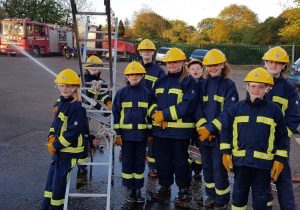 Youngsters with a burning ambition to learn about life as a firefighter are being offered the opportunity to take part in special six-month courses.
Youngsters with a burning ambition to learn about life as a firefighter are being offered the opportunity to take part in special six-month courses.
Every Thursday night, between 6.15 and 8.45pm, Aldridge Fire Cadets are put through their paces at Aldridge Fire Station under the gaze of former Watch Commander Andrew Dickson assisted by a small dedicated group of fellow volunteer instructors.
“To some of the young people, it can be quite a life-changing experience” he told Pioneer. “Parents sometimes comment on how much more confident, assertive and outgoing their children are after they’ve been on the course.
“But that’s because we teach them discipline and structure and expect them to take responsibility for themselves and their colleagues on the course. We even have a ‘no mobile phone’ policy, when they are here.
“It’s great to see how they develop new social skills over the time they are with us.”
There are 20 boys and girls currently on the course, aged from 11 to 15, who dutifully attend each week and support extracurricular activities.
The course has been running in Aldridge since 2008, initially under the auspices of The Young Firefighters Association and latterly rebranded as Aldridge Fire Cadets in line with the National Fire Cadet scheme.
After an initial three-month course proved a success it was extended to six months, and ever since hundreds of youngsters from Aldridge and the surrounding areas have taken part in a scheme which allows them to experience much of what real firefighters do every day.
“The cadets have their own room at the Fire Station and even their own road-worthy fire engine, which is an older one that is now no longer up-to-date enough for fire crews to use on the front line,” Andrew said.
Andrew, who is 60, retired from the brigade in 2010 following more than 33 years’ service. He has retained his involvement with the cadets and, having kept up his HGV licence, drives them to events in their fire engine.
Those events include appearances at carnivals and fayres, as well as providing support as parking marshals at places like Aldridge Transport Museum.
“We are always out and about helping to raise funds with car washing and bag packing,” Andrew said, “which really helps the cadets develop a sense of community.”
But perhaps the most challenging – and exciting – aspect of the course is the firefighter training that the cadets take part in.
“The cadets get a real taste of life as a firefighter,” Andrew said, “learning drills and how to use the hoses, ladders and pumps.
“Underneath the station is a tunnel that the firefighters use for breathing apparatus practice, and we have created some light-weight plastic sets that the children can wear so they can experience it too.
“They love the challenge of going into the pitch black and finding their way through the tunnel using touch only, wearing the apparatus and full mask.”
The cadets also act as casualties in major training exercises for firefighters.
But safety is the number one priority for the cadets whenever they are engaged in training of any kind.
“Out on the yard, it is paramount that they are doing things safely,” Andrew said. “In fact, I purposely have a downtime for 10 minutes every week where they have time to have a chat and a joke around and socialise.
“That way we know that when it’s time to be serious and concentrate they are ready.”
Andrew is very passionate about the scheme, which he describes as ‘shaping young people for adulthood’.
“It teaches then teamwork, builds self-esteem, and also provides an NVQ qualification in Understanding Firefighting, so they have mini lectures and do a little workbook,” he explained.
The course is even set up to accommodate youngsters who do not read and write well, still allowing them to get the qualification and certificate.
At the end of the six-month period, the cadets have a Passing Out parade, where all their family and friends are invited, along with the Mayor of Walsall, and dignitaries from the Brigade. There is also an award for the best cadet on the course.
But perhaps the clearest evidence of the course’s success is the number of cadets who have gone on to become real firefighters.
“There are some that enjoy the six-month experience for what it is,” Andrew said, “and then others who actually develop a real passion for joining the brigade.
“I have had a few that have gone through the course, and then when they have reached 16, have been invited back to be junior instructors, then become adult instructors with me, and then applied to the brigade and become firefighters.
“I follow their pathway, and some of them that have done the course are well into their twenties now and serving as firefighters.”
It seems that while all of Andrew’s cadets are reshaped in some way by six months under his tutelage at Aldridge Fire Station, for a few the experience sparks a connection with firefighting that simply can’t be extinguished.
andrew.dickson@wmfs.net
07989143388




